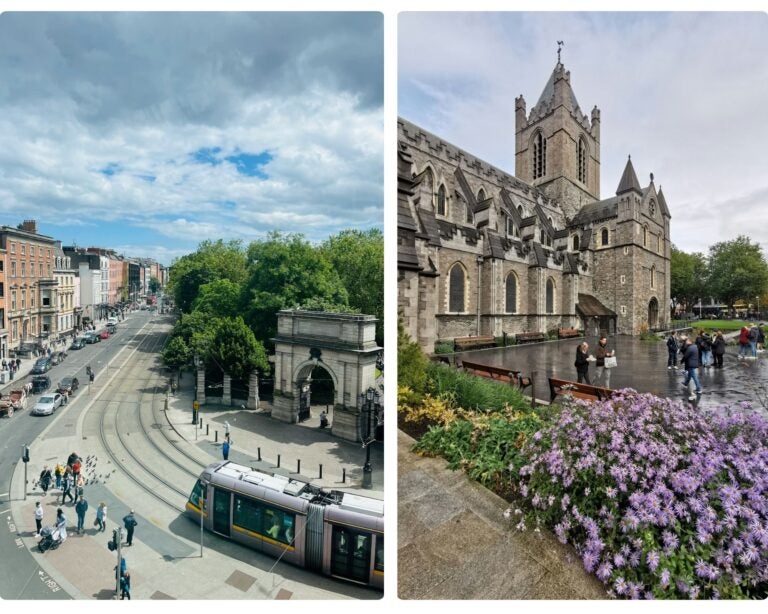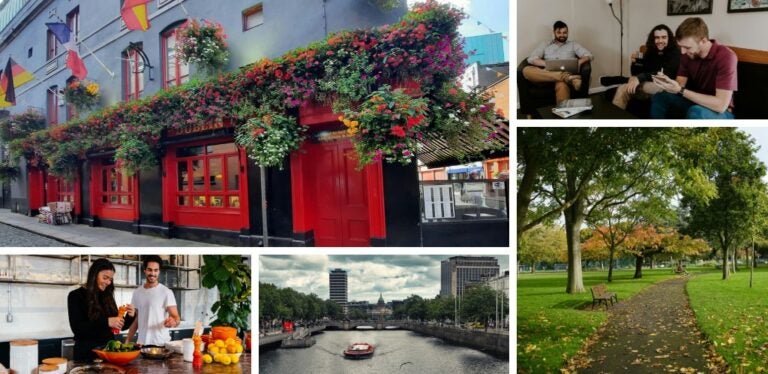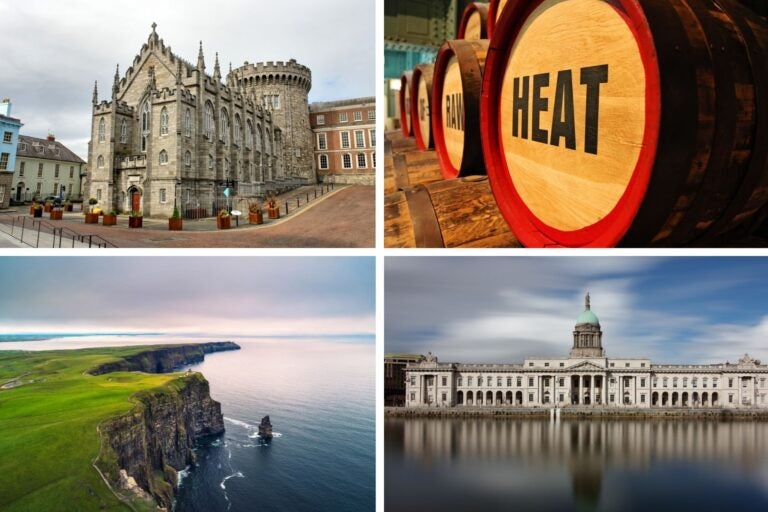Live in Dublin: Learn advantages, disadvantages & costs
Is it a good idea to live in Dublin? Read this post about the quality of life in Dublin and we'll clear up any doubts you may have.
Ireland’s capital is a popular destination, not only for tourists but also for those who choose to live in Dublin for a while to gain professional and personal experience. Whether you’re a digital nomad looking for a city with strong tech infrastructure for remote work, a student planning to start a course, or a slow traveler wanting to dive deeper into the local culture, this article has plenty for you.
If you’re curious about what it’s really like to live in Dublin as an expat, we’ll walk you through everything from education and healthcare to the economy, job opportunities, and safety. We’ll also touch on digital connectivity and highlight the main advantages and challenges of settling in this Irish capital. So, let’s get started exploring Dublin!
Quality of life in Dublin
Dublin offers a high quality of life thanks to its services, natural surroundings, and growing job market. That said, it does come with challenges, such as high rent and a generally expensive cost of living. With this in mind, let’s take a closer look at the key factors to consider if you’re thinking about living in Dublin as a foreigner.
Access to healthcare
Dublin’s healthcare system is run by the Health Service Executive (HSE) and includes both public and private options. The quality of care is excellent, but access depends on your residency status and income level. Unlike countries such as Spain, public healthcare here isn’t completely free and is organized into three different levels.
- Medical Card holders: Free medical care, which covers general consultations, hospital stays, and certain medications. Eligibility depends on your income and residency status.
- GP Visit Card holders: Entitled to free visits to their primary care physician, but not to all services covered by the Medical Card.
- Users without a card: Patients pay a fee for each service, for example about $56.75 for a doctor visit or $113 for emergency care.
If you are from an EU country, you can access free public healthcare by applying for the European Health Insurance Card (EHIC) in your home country for temporary stays. But if you plan to live in Dublin long-term, you’ll need to register as a resident and apply for a Medical Card. For non-EU citizens, private health insurance is required to cover basic care and hospital services. After one year of living in Ireland and contributing to social security, you may become eligible for public healthcare.
What it’s like to study in Dublin
The education system in Dublin is globally recognized for its high-quality teaching and its human-centered approach, focusing on the student as an individual. This style of education encourages creativity, critical thinking, and empathy.
Dublin is a great city for students from around the world. You can apply for scholarships offered by the Irish government to help international students study here. Many people also come to Dublin to learn English at specialized schools or to pursue advanced degrees at top universities like Trinity College, University College Dublin, or Dublin City University. On top of that, the Graduate Stay Back Visa allows you to stay for up to two years after finishing a master’s or PhD to gain work experience.
Students from the EU enjoy the same benefits as Irish citizens. For example, if you’ve lived in the EU for the past three years, you won’t have to pay tuition fees for undergraduate programs. Non-EU students, on the other hand, must pay tuition and also apply for a student visa through the Irish embassy.

Safety in Dublin
According to Numbeo’s 2024 index, Dublin has a moderately high crime rate compared to other European capitals, scoring 52 out of 100 for safety and 48 for crime. Living in Dublin isn’t particularly dangerous, but it’s important to be aware of the city’s safety issues and take the usual precautions.
The most common crimes in Dublin include petty theft, vandalism, public drinking, and drug-related issues in certain areas such as Ballymun, Finglas, Tallaght, Crumlin, and the North Inner City. If you’re looking for a safe and quiet place to live, we highly recommend neighborhoods like Ballsbridge, Ranelagh, Donnybrook, Clontarf, and Drumcondra.

This is Dublin’s economy and its labor market
Dublin has a thriving economy, thanks in large part to the many multinational companies based there. The city’s low corporate tax rate of 12.5% and other business-friendly policies make it a magnet for foreign investment. Overall, Dublin plays a key role in Ireland’s economy, contributing roughly $66 billion to the national GDP of $586 billion, which helps make Ireland one of the richest countries in the EU.
If you are interested in moving to Dublin to work for a local company, you can do so. EU citizens do not need a visa, while non-EU citizens will need a work visa. The sectors with the highest demand for workers are:
- Technology: Software development, AI, and cybersecurity.
- Financial services: Accounting, banking, and insurance.
- Engineering: Renewable energy and construction.
- Life sciences: Biotechnology and pharmaceuticals.
- Education and healthcare: Teaching and medical services.
Internet connection
Internet in Dublin is generally reliable, especially in the city center, where average speeds reach around 108 Mbps and fiber-optic connections are widely available. Major providers include Virgin Media, Eir, Vodafone, and Sky Ireland, all of which make it easy to browse the web, shop online, and use international e-commerce services.
It’s true that in more rural, nature-filled areas, internet can be less reliable. If you are a digital nomad who needs fast, stable, and secure 5G coverage anywhere in Dublin, Holalfy’s monthly plans make remote work easy. You can get unlimited data and connect two devices at the same time for $64.90.
Important: If you are a frequent traveler and want to stay connected without worrying about expensive roaming or looking for a new SIM at every destination, Holafly’s subscription plans are for you. With a single eSIM, enjoy internet in more than 170 countries for a fixed price and no surprises on your bill. Travel without limits and connect easily and securely! 🚀🌍

Advantages of living in Dublin
Living in Dublin comes with many advantages beyond what we’ve already discussed, including a lifestyle connected to nature and well-being. If you enjoy the outdoors, the city offers some of the cleanest air in Europe, and its wild landscapes make it a truly enviable place to live. Here are all the benefits Dublin has to offer:
- Job opportunities: The city is home to the headquarters of Google, Facebook, Microsoft, and Amazon, creating a wealth of high-paying job opportunities.
- Multicultural city: Around a quarter of Dublin’s residents are from abroad, making it an open, diverse, and welcoming city where making new friends is easy.
- Access to nature: Dublin is a growing city, yet it still offers plenty of green spaces, parks, and nearby natural areas like the Wicklow Mountains and the coastline. This makes it easy to enjoy outdoor activities such as hiking or surfing.
- High air quality: Dublin is recognized as one of Europe’s cleanest cities for air quality, according to the European Environment Agency’s 2023 report. This makes it an ideal place for good respiratory health, particularly for seniors and anyone seeking a healthy lifestyle.
- Explore other destinations: Thanks to low-cost airlines like Ryanair, it’s easy to find very affordable flights to cities such as London, Paris, Amsterdam, Barcelona, or Berlin. You can reach most European capitals in under three hours, which is a big plus for anyone who loves to travel.

Disadvantages of living in Dublin as a foreigner
The biggest drawback of living in Dublin is its high cost of living, which can have a significant impact on your finances. How manageable this is will depend on your profession and salary, as you’ll need to cover your monthly expenses and make ends meet. We’ve also outlined some other less favorable aspects of life in Ireland’s capital.
- High cost of living: The cost of living in Dublin is quite high. Renting a one-bedroom apartment in the city center can start at around $2,270 per month. Entertainment, services, and groceries are also more expensive than the European average.
- Housing shortage: Limited rental housing and high demand in Dublin have driven prices up. As a result, many foreigners end up sharing apartments or living in co-living spaces.
- Gray and rainy weather: Dublin’s weather can take some getting used to for those from sunnier climates. Winters are chilly, the skies are often gray, and rain is common for much of the year. If you’re not accustomed to it, the limited sunshine can affect your mood.
- Limited public transportation: Public transport in Dublin isn’t as efficient as in some other European cities. The city only operates trams, buses, and trains, and outside the city center, the schedules run on a limited basis.
Frequently asked questions about living in Dublin
In Dublin, people recommend having an intermediate or advanced level of English, such as B2 or higher, for daily life and to secure a skilled job.
Dublin has a mild, oceanic climate with cool summers and gentle winters. Rain is common throughout the year, even in summer, with temperatures ranging from 2 to 8 °C in winter and 15 to 22 °C in summer.
EU citizens don’t need a visa, but non-EU nationals do. They must obtain a visa to live or work in Ireland and also register with the Immigration Registration Office.
Yes, Dublin is home to a vibrant international community, with many Spaniards, Brazilians, Italians, and French. You can also connect through social media groups, language exchanges, meetups, and cultural clubs, making it easy to settle in.
Yes, the Irish are friendly and welcoming, which makes it easier to adjust to the local culture. The city’s multicultural atmosphere, active social life, and the widespread use of English also help newcomers settle in quickly.





 Language
Language 


















 No results found
No results found


